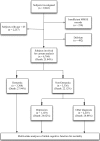Mini-mental state examination as a predictor of mortality among older people referred to secondary mental healthcare
- PMID: 25184819
- PMCID: PMC4153564
- DOI: 10.1371/journal.pone.0105312
Mini-mental state examination as a predictor of mortality among older people referred to secondary mental healthcare
Abstract
Background: Lower levels of cognitive function have been found to be associated with higher mortality in older people, particularly in dementia, but the association in people with other mental disorders is still inconclusive.
Methods and findings: Data were analysed from a large mental health case register serving a geographic catchment of 1.23 million residents, and associations were investigated between cognitive function measured by the Mini-Mental State Examination (MMSE) and survival in patients aged 65 years old and over. Cox regressions were carried out, adjusting for age, gender, psychiatric diagnosis, ethnicity, marital status, and area-level socioeconomic index. A total of 6,704 subjects were involved, including 3,368 of them having a dementia diagnosis and 3,336 of them with depression or other diagnoses. Descriptive outcomes by Kaplan-Meier curves showed significant differences between those with normal and impaired cognitive function (MMSE score<25), regardless of a dementia diagnosis. As a whole, the group with lower cognitive function had an adjusted hazard ratio (HR) of 1.42 (95% CI: 1.28, 1.58) regardless of diagnosis. An HR of 1.23 (95% CI: 1.18, 1.28) per quintile increment of MMSE was also estimated after confounding control. A linear trend of MMSE in quintiles was observed for the subgroups of dementia and other non-dementia diagnoses (both p-values<0.001). However, a threshold effect of MMSE score under 20 was found for the specific diagnosis subgroups of depression.
Conclusion: Current study identified an association between cognitive impairment and increased mortality in older people using secondary mental health services regardless of a dementia diagnosis. Causal pathways between this exposure and outcome (for example, suboptimal healthcare) need further investigation.
Conflict of interest statement
Figures



References
-
- Paradise M, Walker Z, Cooper C, Blizard R, Regan C, et al. (2009) Prediction of survival in Alzheimer's disease–the LASER-AD longitudinal study. Int J Geriatr Psychiatry 24: 739–747. - PubMed
-
- Walsh JS, Welch HG, Larson EB (1990) Survival of outpatients with Alzheimer-type dementia. Ann Intern Med 113: 429–434. - PubMed
-
- Bowen JD, Malter AD, Sheppard L, Kukull WA, McCormick WC, et al. (1996) Predictors of mortality in patients diagnosed with probable Alzheimer's disease. Neurology 47: 433–439. - PubMed
-
- Bassuk SS, Wypij D, Berkman LF (2000) Cognitive impairment and mortality in the community-dwelling elderly. American journal of epidemiology 151: 676–688. - PubMed
Publication types
MeSH terms
Grants and funding
LinkOut - more resources
Full Text Sources
Other Literature Sources
Medical
Research Materials

